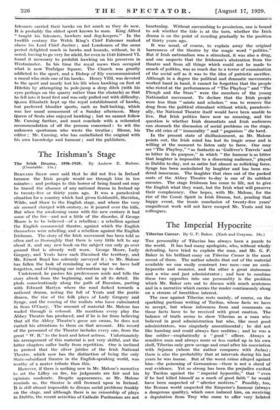The Irishman's Stage
The Irish Drama, 1896-1928. By Andrew E. Malone. (Constable. 158.)
BERNARD SHAW once said that he 'did not live in Ireland because the Irish people • would see through hint in ten minutes ; and perhaps to this horror of being found out may be traced the absence of any national drama in Ireland up to twenty-five or thirty years ago. It was a paradoxical situation for a country which had given Goldamith, Sheridan, Wilde, and Shaw to the English stage, and where the very air seemed charged with oratory, as it poured over the hills. But when the awakening came with the new century it had some of the fire—and not a little of the disorder, if George Moore is to be believed—of a rebellion : a rebellion against the English commercial theatre, against which the English themselves were rebelling, and a r'ebellion against the English Irishman. The story of the Irish movement has been told so often and so thoroughly that there is very -little left to say about it, and any new book on the subject- can only go over ground that is already well worn. George Moore, Lady Gregory, and Yeats have each illumined the territory, and Mr. Ernest Boyd has solemnly surveyed it ; to Mr. Malone has fallen the task of reminding us of what we have half forgotten, and of bringing our information up to • date.
Undeterred, he pushes his predecessors aside and tells the story afresh from the beginning, and in all its detail. He plods conscientiously along the path of Ibsenism, parting with Edward Martyn where the road forked towards a national drama, noting the fall of Yeats and the poetic drama, the rise of the folk plays of Lady Gregory and Synge, and the coming of the realists who have culminated in Sean O'Casey. -• The amount of material Mr. Malone has waded through is colossal. He mentions every play the Abbey Theatre has produced, and if -he is far from believing that all the Abbey :Theatre's geese are swans, he does not curtail his attentions to them on that account. His record of the personnel of the Theatre includes every one, from the great " W. B." to the least and latest' actress. Unfortunately his arrangement of this material is not very skilful, and the latter chapters suffer badly from repetition. One is inclined to protest that the silver jubilee of the Irish National Theatre,- which now has the distinction of. being the only State;subsidized theatre in the English-speaking world, was worthy of a neater tribute than this.
HoweA•rer, if there is nothing new in Mr. Malone's narrative to set the Liffey on fire, his judgments are fair and his opinions moderate. Despite appearances, as Mr. Malone reminds us, the the.atre is still frowned upon in Ireland; It is still almost impossible to &amiss social problenis frankly on the stage, and althoUgh there is 'no censoiship Of plays in Dublin; the recent activities of.Catholic Puritanism are -not heartening. Without succumbing to pessimism, one is bound to ask whether the tide is at the turn, whether the- Irish drama is on the point of receding gradually to the position of thirty years ago.
It was usual, of course, to explain away the original barrenness of the theatre by the magic word " politics." But if Irish nationalism was a stimulant, it was also a drug, and one suspects that the Irishman's abstention from the theatre and from all things which could not be made to smack of politics, was as much due to a terror of examination of the social self as it was to the idea of patriotic sacrifice. Although in a degree the political and dramatic movements worked hand in hand, it cannot be forgotten that the people who rioted at the performances of " The Playboy" and "The Plough and the Stars" were the members of the young Nationalist movement. To declare that the Irish peaple were less than " saints and scholars " was to remove 'the drug from the political stimulant without which, paradoxic- ally, the National Theatre itself would have been unable to live. But Irish politics have now no meaning, and the question is whether Irish dramatists and Irish audiences can stomach the discussion of social problems on the stage. The old cries of " immorality " and " paganism " die hard.
In the present state of disillusionment, as Mr. Malone points out, the Irish mind has lost its tragic sense and is willing at the moment to listen only to farce. One may see "The Playboy," "as fantastic as Gulliver's Travels' and as bitter in its purpose," in which " the humour is so bitter that laughter is impossible to a discerning audience," played in Dublin to-day, not as satire but almost as rollicking farce. Synge has been assimilated by laughter and has been ren- dered innocuous. The laughter that rises out of the packed seats of the Abbey Theatre to-day is one of its subtlest enemies. The stage Irishman has come to life, not to give the English what they want, but the Irish what will preserve their complacency. One hopes, with Mr. Malone, for the rise of the Comic Spirit in Irish Drama, but, pending that happy event, the ironic conclusion of twenty-five years' magnificent work will not have escaped Mr. Yeats and his colleagues.
































 Previous page
Previous page